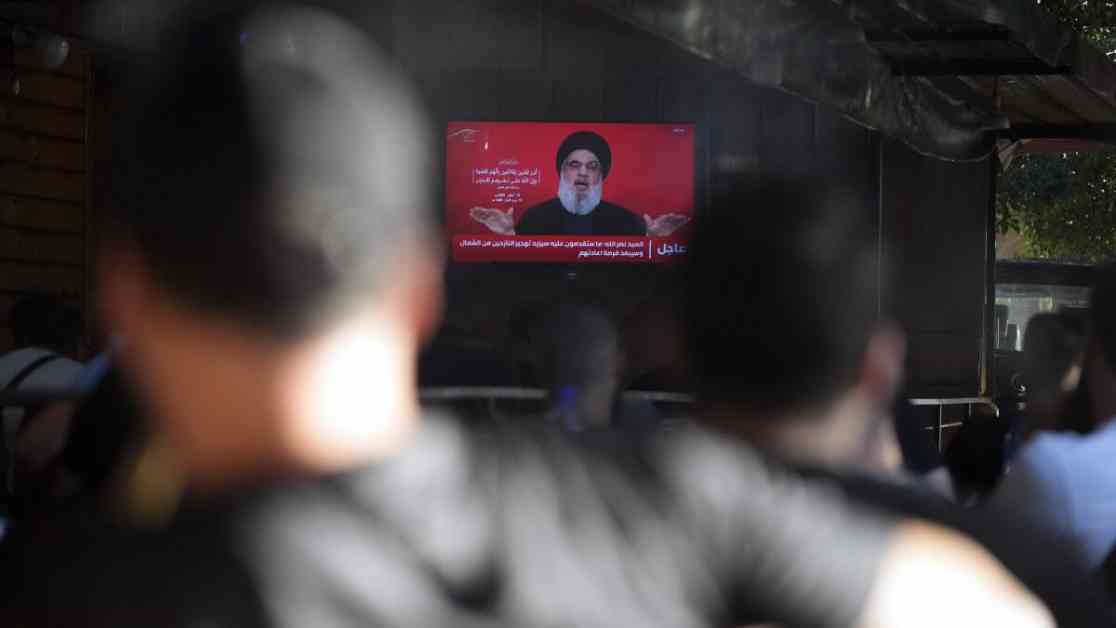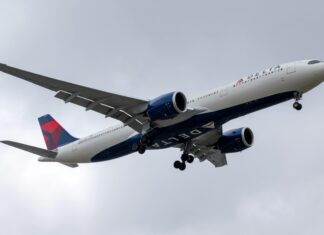Hezbollah Leader’s Resilient Response to Recent Setback
BEIRUT — Amidst the roar of Israeli warplanes overhead, Hezbollah leader Hassan Nasrallah delivered a defiant response on Thursday, accusing Israel of exceeding all boundaries with the recent wave of deadly detonations of electronic devices. Despite acknowledging the significant blow dealt to the group, Nasrallah vowed retaliation against Israel for their actions.
Nasrallah’s address marked his first televised appearance following the explosions of thousands of handheld pagers and walkie-talkies on Tuesday and Wednesday, resulting in the deaths of 37 individuals and injuries to around 3,000 others. Israel has neither confirmed nor denied responsibility for the attacks, however, it is widely believed that they orchestrated the bombings. U.S. officials disclosed that they were provided with some details after the fact by Israel, indicating that Israel intercepted a shipment of devices purchased by Hezbollah and rigged them with explosives.
Hezbollah leader Nasrallah affirmed that the group has no intentions of backing down in the face of adversity. He stated, “This big and powerful blow did not and will not bring us down.” As tensions escalated between Israel and Lebanon, both sides continued to engage in retaliatory air strikes on Thursday.
The Israeli military announced that they were targeting locations within Lebanon to “degrade Hezbollah’s terrorist capabilities and infrastructure.” Meanwhile, Nasrallah delivered his address from an undisclosed location, with no usual gatherings in Hezbollah-affiliated convention centers to watch, showcasing the group’s heightened security measures following what many consider to be a significant security breach.
In the recent attack, approximately 5,000 pagers distributed among Hezbollah fighters and officials across the country were detonated simultaneously, followed by around 1,000 walkie-talkies exploding the next day. Hezbollah had resorted to using older communication technologies in an attempt to evade Israeli surveillance of cellphones.
Israel’s Aggressive Stance and Hezbollah’s Response
In recent days, Israel has been signaling a more aggressive stance towards Hezbollah. Israeli Defense Minister Yoav Gallant declared that the conflict was entering a “new phase,” while the Israeli military’s chief of staff, Lt. Gen. Herzi Halevi, approved new plans for the northern conflict zone. Gallant mentioned that he had been in communication with U.S. Defense Secretary Lloyd Austin regarding Israel’s defense against Hezbollah threats.
Nasrallah revealed that technical and security committees were investigating the incident, downplaying the impact on Hezbollah’s military leadership by stating that higher-ranking commanders were unaffected as they were using older pagers. Hostilities between Israel and Lebanon reignited after Hezbollah launched rocket barrages into Israel on October 8 in support of the Palestinian armed group Hamas.
The ongoing conflict between Israel and Hezbollah has led to approximately 90,000 people in Lebanon’s south and 60,000 individuals in northern Israel being displaced from their homes. Nasrallah reiterated Hezbollah’s support for Hamas and conveyed a message to Israeli Prime Minister Benjamin Netanyahu and Defense Minister Gallant that the Lebanese front would not cease until the aggression on Gaza stops.
Implications and Speculations for the Future
The two-day attacks severely disrupted Hezbollah’s internal communication capabilities, but the group maintains a formidable arsenal of weapons. Israeli analysts have suggested that the electronic device attacks could be a prelude to a broader conflict.
Retired Brig. Gen. Amir Avivi, now a military analyst, emphasized the gravity of the situation by stating, “You don’t hit thousands of people like that and think war is not imminent.” The tension between Israel and Lebanon continues to escalate, with both sides preparing for potential further clashes.
As the situation unfolds, the region remains on edge, with the potential for a full-scale war looming in the background. Nasrallah’s unwavering stance against Israel’s actions reflects Hezbollah’s determination to stand strong despite facing significant setbacks. The repercussions of these recent events are likely to shape the future dynamics of the conflict between Israel and Hezbollah.



























